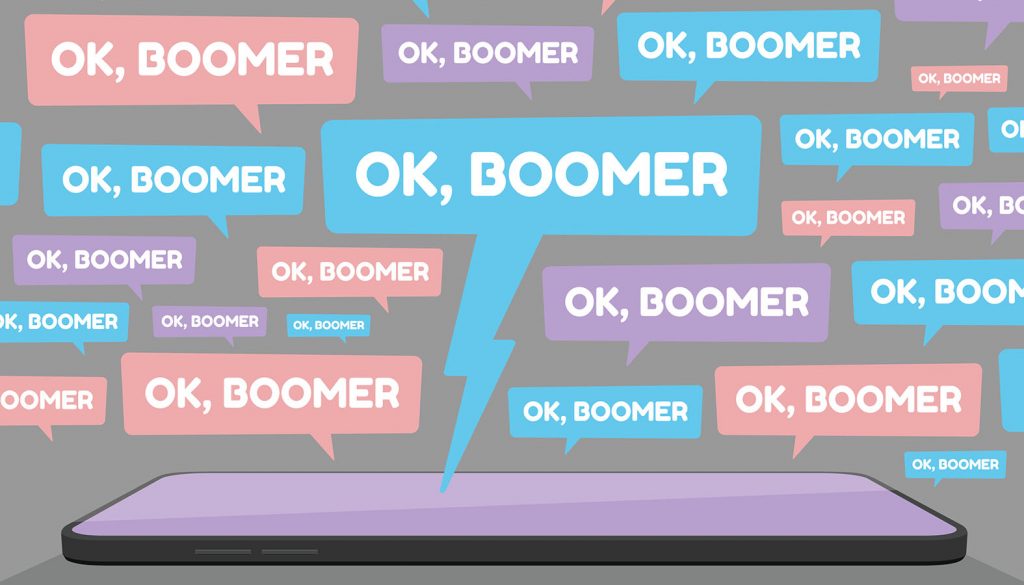Can’t we all just get along? Can Americans of different ages stop sniping at one another just long enough to hear one another out?
Maybe then we could peacefully coexist. You see, Americans aren’t just divided by religion, race, ethnicity, national origin, gender, sexual orientation, and all the rest. We are also divided by our birth dates.
Most of the time, those divisions lay quietly beneath the surface. Until they rise to the top.
Like now. Here is something that could liven up Thanksgiving dinner: a generational war might be brewing.
First, let’s look at the seating arrangement. In 2019, gathered around the nation’s dinner tables, you’ll find six generations: the few remaining members of the esteemed World War II generation, now in its late 80s to early 90s; the so-called silent generation, whose members were born between 1935 and 1944 and are now in their late 70s to mid-80s; the baby boomers, that huge cohort of 69 million people born after World War II between 1946 and 1964, who are now in their early 60s to mid-70s; Generation X, born in the early-to-mid 1960s to the early 1980s, who are now in their late 30s to late 50s; the millennials, who were born from 1981 to 1996, and are now in their early 20s to mid-30s; and finally, the group called Generation Z, those born from 1996 to 2015, who are now in their childhood, teen years, and early 20s.
Americans are not ready for this war. In the couple of years since the 2016 election, Americans have spent the days leading up to a holiday taking to social media to lament about the awkwardness of having to pass the mashed potatoes to MAGA relatives or Never Trumper kinfolk, given what they had posted on Facebook. Their differences were political, not sewn into their DNA.
Generational differences go deeper. How you see the world and how you treat your fellow human beings are, to a large degree, shaped by when you were born.
The baby boomers made that point, in the 1960s, when they marched for civil rights and against the Vietnam War. The way they saw it, their parents in the World War II generation were out of step with a society that was undergoing a radical transformation. “The times they are a-changin’,” crooned Bob Dylan, himself a member of the silent generation. The boomers adopted a warning: “Don’t trust anyone over 30.”
In the 1990s, the baby boomers shifted their ire toward my tribe: Generation X, who represent their younger siblings. As baby-boomer writer Michael Kinsley put it back then, “These kids today. They’re soft. Not only have they never had to fight a war. They never even had to dodge one.”
For the baby boomers, this self-absorbed generation that can’t seem to get along with anyone, the next logical target was the millennials, who often represent their children.
But the millennials have struck first with a new dismissive catch phrase: “Ok, boomer.” The millennials know they’re about to be criticized, mocked, or attacked, and so they beat their critics to the punch by saying, in essence: “Take your best shot. We don’t care.”
The millennials are convinced that they’re about to inherit a polluted planet, a fractured society, a corrupt government, and a dysfunctional public discourse. The youngsters contend that the baby boomers, who have always known how to have a good time, often think themselves entitled, and don’t know how to play with one another or anyone else, made this mess and left it behind for someone else to clean up.
The millennials aren’t interested in picking up a broom, or in being the boomers’ latest generational punching bag.
This was predictable. The millennials were given a double helping of self-esteem by baby boomers, who outlawed red pens for grading papers, awarded participation trophies, and adorned their minivans with signs that read: “Caution: Baby On Board.” Millennials don’t take orders. They take names.
One example is Greta Thunberg, the 16-year-old Swedish climate change activist who unflinchingly scolded her elders in a recent address at the United Nations over their inattention to the challenge of climate change.
What I did not see coming, however, was that so many baby boomers would be so thin-skinned that they would immediately take offense at being told to take a hike. I’ve read a dozen or so articles and columns in the last few weeks by boomers who are accusing the millennials of “ageism” and worse.
Also, the boomers clearly don’t enjoy being on the opposite end of a generational zinger. A generation that has always seen itself as the global solution doesn’t appreciate being told that it’s the problem.
And all this because of two little words: “Ok, boomer.” Man, they don’t call them “baby” for nothing.

